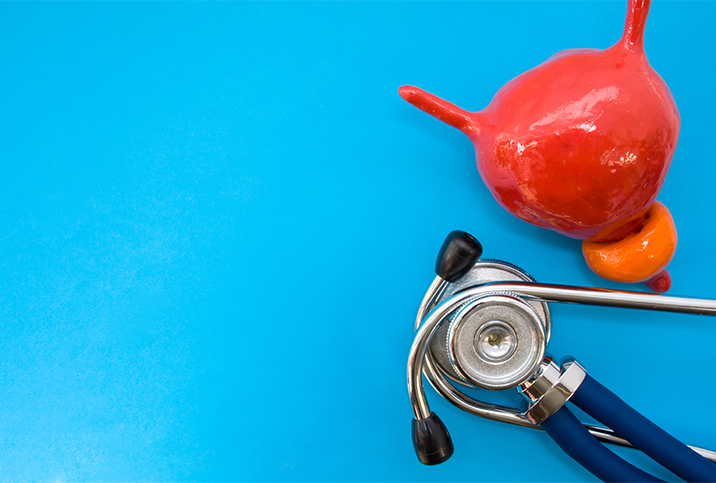Prostate Health: Myths & Misconceptions

The prostate is often the forgotten member of the male sexual function band. But if the penis and testicles are the guitarist and bassist of this all-star musical group, the prostate gland is the drummer: Without that driving force, the band is going nowhere.
That’s because this walnut-sized muscular gland is responsible for both making semen and acting as a pump, pushing the semen up to the urethra to mix with sperm and exit the penis when a man ejaculates. What's more, nerves in the prostate help fire up a man's erection.
So if you want to keep the band together and keep on rocking to a ripe old age, it helps to master the basics first. Let's debunk some of the common prostate myths.
Myth: If I develop prostate cancer, I will know it.
Reality: Prostate cancer frequently has no detectable symptoms. Men often can't feel or notice it on their own until it spreads to other parts of the body. That's why appropriate screening—depending on your age and other risk factors—is so important.
The other reason to get screened is that prostate cancer is one of the most beatable cancers if it's caught early. Men who get treatment for early-stage prostate cancer have a 10-year survival rate of 98 percent. After 15 years, that number remains high, 96 percent, so your odds are good if you catch it early, which you can only do if you know you have it. Get screened!
Myth: A high number on a prostate-specific antigen test (PSA) means I have prostate cancer.
Reality: Many factors besides prostate cancer can contribute to a high PSA reading.
PSA tests are falling under increasing scrutiny, both for potential inaccuracies that do more harm than good and also because of how some clinicians are, or have been, too reliant on them for a definitive diagnosis.
We now know that elevated PSA levels can be caused by a wide array of factors, including:
- Recent bicycle riding
- Recent ejaculation
- Recent testing on your bladder
- A urinary tract infection
- Prostatitis
- An enlarged prostate (benign prostatic hyperplasia, or BPH)
- Recent PSA testing
Myth: Testosterone causes prostate cancer.
Reality: This male hormone simply isn't to blame. For years, a belief persisted that testosterone was the cause of prostate cancer, but recent studies suggest otherwise. One meta-analysis used data from a number of studies that examined men who had received testosterone replacement therapy following a prostatectomy; it found that patients who received testosterone actually showed lower levels of prostate cancer biomarkers returning.
That's a complicated way of saying there’s truly no simple answer to the question of what causes prostate cancer. Testosterone replacement therapy—and naturally occurring testosterone—may have pros and cons, but directly causing prostate cancer just isn't among the cons.
Myth: Prostate cancer means the end of my sex life.
Reality: Treatment options abound, so, no, this myth falls flat.
A diagnosis of prostate cancer did once spell doom for a man's libido and his ability to get an erection, but that was long ago. These days, when removing part or all of the prostate, surgeons can perform what's called "nerve-sparing" surgery to avoid severing the nerves and blood vessels that help drive a man's erections. Another option is radiation seeding therapy, in which small pellets or ribbons of radioactive material are strategically placed near the cancerous cells in such a way that much of the prostate can be spared, along with those precious nerves.
What's more, most prostate cancer is slow growing—certainly not all, though; there are aggressive forms that metastasize rapidly—which allows time for patients and doctors to discuss the risks versus the benefits of treatment options such as surgery and radiation. Men often live with what may or may not turn out to be prostate cancer for years before treatment is recommended.
Remember, protecting yourself from cancer starts with a healthy lifestyle: eat nutritious foods, exercise and get tested when appropriate. Your band relies on its drummer, and that means you have to do what it takes to keep the prostate banging out the beat.


















